Ritchie Building
Named after William Ritchie (1854-1931), a classical scholar and educationist. He obtained his M.A. at Aberdeen University in 1873 and continued his studies at Oxford where he was a contemporary of Cecil John Rhodes at Oriel College. He was a lecturer in classics and English at the Grey Institute, Port Elizabeth where he taught from 1879 to 1882. It was from here that he was appointed Professor of Classics at the South African College in 1882. In 1903, when the Chairs of Greek and Latin were separated, he chose latin. Ritchie remained a dominant figure in classics at SAC/UCT until his retirement in 1929. Outside the lecture room, Ritchie devoted his life to the development of the SAC as a centre of learning and education and the furtherance of education in South Africa. During his 20 years at the SAC, he formed, with P.D Hahn and C. E Lewis, a triumvirate that guided the fortunes of the college through hardships. Together with his colleagues in 1884, he successfully opposed an attempt by the Department of Education to appoint an inspectorate for the constituent colleges. In 1900 he was responsible for moving college examinations from June to December on the basis that this was in line with South African climatic conditions. He was one of the chief protagonists of a single teaching university for South Africa, an idea that was realised when the South African College became the University of Cape Town in 1918. Ritchie was Secretary (and later vice-chairman) of the College Senate. After 1918, he served on the Council of UCT and was Dean of the Faculty of Arts until his retirement. He took a great interest in his students and was president of the football, tennis, cricket and athletics clubs. He also toured as manager for the rugby team. As a great lover of music, he took a leading role in the founding of the South African College of Music in 1909, its subsequent development and its eventual amalgamation with UCT in 1923, when it became a faculty of the university. He held an honorary D. Litt. conferred upon him by UCT. Source: Origins of Names of Buildings at the University of Cape Town, Mr M. Musemwa (Department of History UCT, 1993). Honorary of D.Litt William Ritchie, 1 October 1929. Haarhoff, T. 1970. UCT. Vol. 3 (9) June 1970. Letter to V Forrest, 28 July
1965. Archives: BUZV Ritchie, William.
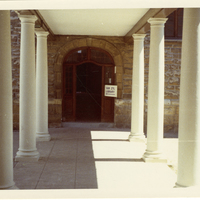 Brand Van Zyl Law Library
Brand Van Zyl Law Library The Bindery Lab
The Bindery Lab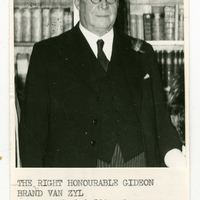 Photo of Rt Hon Gideon Brand Van Zyl
Photo of Rt Hon Gideon Brand Van Zyl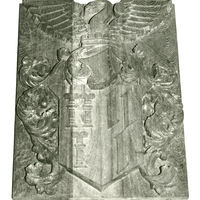 Van Zyl family crest
Van Zyl family crest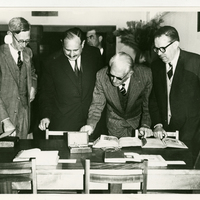 Brand van Zyl Law Library official opening
Brand van Zyl Law Library official opening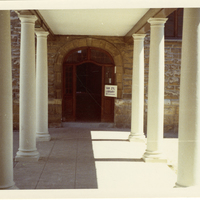 Entrance to Brand van Zyl Law Library, Orange street Campus
Entrance to Brand van Zyl Law Library, Orange street Campus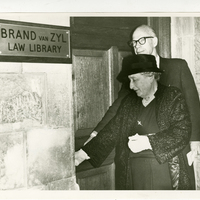 Mrs van Zyl performing opening ceremony of the Brand van Zyl Law Library
Mrs van Zyl performing opening ceremony of the Brand van Zyl Law Library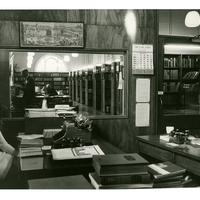 Reception area of Brand van Zyl Law Library
Reception area of Brand van Zyl Law Library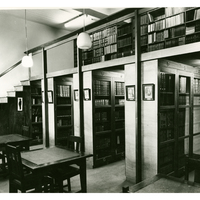 Portraits of jurists hang on the edge of bookstacks in Brand van Zyl Law Library
Portraits of jurists hang on the edge of bookstacks in Brand van Zyl Law Library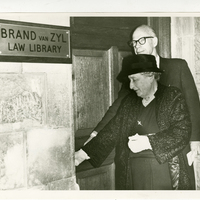 Brand van Zyl Law Library opens
Brand van Zyl Law Library opens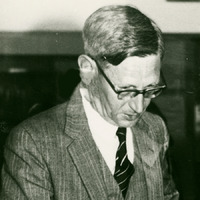 First Law Librarian appointed
First Law Librarian appointed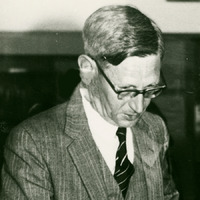 E. J. Roukens de Lange
E. J. Roukens de Lange


